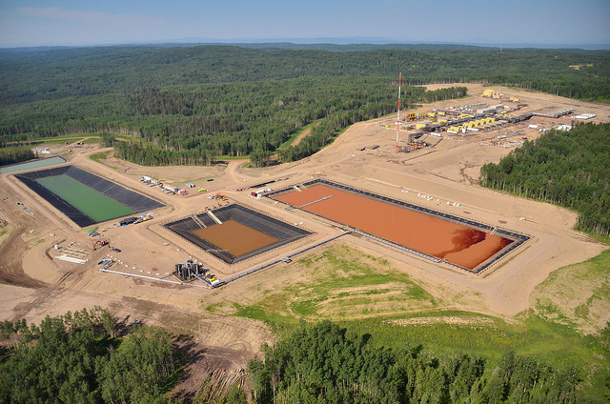British Columbia’s oil and gas royalty system is set to be overhauled this fall.
The new system, which was announced last week, kicks in Sept. 1, 2022, and includes scrapping one of the industry's largest subsidies, the Deep-Well Royalty Credit program. It will also increase the minimum royalty rate from three per cent to five per cent, with royalty rates to range from five to 40 per cent. The new framework will be phased in over two years and take full effect on Sept. 1, 2024.
In B.C., when a company wants to access a publicly owned resource such as gas, lumber or water, it pays what's known as a royalty to the province. The money collected through royalties is used to fund public services, such as education and health care.
But royalties aren’t always as straightforward as paying a set rate. In B.C., the oil and gas royalty system is decades old and, after years of amendments, really complicated.
How complicated can the system be? As part of a comprehensive year-long review completed last year, an independent academic assessment of the system found it was "broken" because it was so complex. Also included in the review were the results of a public consultation that showed the majority of people wanted higher royalties and lower subsidies.
In B.C., subsidies have traditionally encouraged fossil fuel production. Over the years, there has been growing pressure on government to reduce the subsidies that companies receive in exchange for development.
According to an analysis of the 2022 B.C. budget by the environmental advocacy organization Stand.earth, B.C.’s oil and gas industry received a total of $1.9 billion in subsidies in 2021.
The system overhaul aims to address these concerns. But critics say that while it takes some big steps in the right direction, it falls short of what's needed to ease the global climate crisis.
As an example, they point to the creation of a new subsidy that incentivizes more hydraulic fracturing — fracking — in the province that in no way works to diminish the fossil fuel industry.
In order to avoid the worst impacts of climate change, experts including climate scientists, the United Nations Intergovernmental Panel on Climate Change and the International Energy Agency agree that three things are necessary: winding down fossil fuel use, reducing energy use and transitioning to renewable energy.
Humans have, so far, warmed the planet by 1.2 C and are already experiencing the results of the rising temperature. Last year, British Columbians contended with a deadly heat dome, an intense wildfire season and an atmospheric river that caused roads to wash out and flooding throughout the Fraser Valley.
Extreme weather events are expected to worsen as the planet continues to warm, which is why governments around the world signed on to the Paris Agreement in 2015 to try and keep global warming to 1.5 C. That temperature increase means there will be more heat waves, flooding and habitat destruction. If we warm beyond 1.5 C scientists predict we’ll never be able to cool the planet back down, and the chaos of climate change will be here to stay, forever.
Axing the ‘most egregious’ subsidy
While the new system won’t wind down the fossil fuel industry, or make fracking companies pay for the entire cost of pollution and climate change, the government has acknowledged that the “headline subsidies” are unacceptable in the current political climate, says Alexandra Woodsworth, campaigns manager with the environmental organization Dogwood BC.
Under the Deep-Well Royalty Credit program, for example, fracking companies were able to avoid paying $1.2 billion in royalties in 2021. Subsidies now on the chopping block include the Deep-Well Royalty Credit, as well as Marginal Well, Ultramarginal Well, Low Productivity Well Rate Reduction and the Clean Growth Infrastructure Royalty programs.
In a press release, Sonia Furstenau, leader of the BC Greens and MLA for Cowichan Valley, noted how the Deep-Well Royalty Credit was the “most egregious” subsidy in B.C., but also “far from the only one.”
There will also now be time limits for cashing in existing credits. Before the new system was announced last week fracking companies could hold on to these credits indefinitely to cash them in at a later date. The Deep-Well Royalty Credit program has amassed $3.4 billion in credits, but under the new program starting Sept. 1, 2022, the clock starts ticking on a four-year deadline to either use them or transfer them to a new “environmentally focused land healings and emissions reductions pool,” the government said.
This pool is “intended to support work going above and beyond regulatory requirements to reduce emissions or cumulative impacts on the land base,” and will be developed over the coming months after talking with First Nations in northeastern B.C., environmental groups, industry and other stakeholders, the government said. Unused credits will expire.
Peter McCartney, a climate campaigner with the environmental non-profit group Wilderness Committee, says it seems like the government is still fleshing out this part of its plan. Many environmental voices were calling for the amassed credits to be eliminated entirely — but cancelling the credits would likely have ended in litigation because companies wouldn’t want to give up the credits without a fight, he says.
McCartney says it’s understandable, albeit disappointing, that government is taking a different approach, but adds that how those credits will be used, and if there will be any left over after four years, is still yet to be seen.
In an interview, Furstenau said the government should be more transparent about the activities of fracking companies, their revenues and royalties, “and especially how they apply these credits they've accrued over the last several years.”
“That should be a given,” she said.
It’s likely most companies will use their amassed credits over the course of the new four-year window, but if there was money left over it could be used to help fund Indigenous restoration projects, says Sven Biggs, Canadian oil and gas programs director for Stand.earth. He notes Treaty 8 First Nations have been running site reclamation projects in northeast B.C. for years and funding the projects out of pocket.
But because the new system will be brought online in stages, there could also be a “dash for gas” as companies scramble to build or get new wells approved before the new regulations come fully into effect, warns Dogwood’s Woodsworth.
New framework comes with new oil and gas subsidy
While the new system will be based on a revenue-minus-cost royalty system, which the government says is globally recognized for “maximizing economic value,” it’s essentially a new fossil fuel subsidy, according to McCartney, Biggs and Woodsworth.
That’s because under the new framework, fracking companies get a money-back guarantee for the cost of drilling their wells.
Companies will be able to pay a low royalty cost, likely the new five per cent minimum, until they pay off the cost of the well, McCartney explains.
“The cost of drilling is higher in some areas, lower in others, but no matter what the cost, the public is taking on that risk,” he said. “You can drill wherever you want and get your money back before you pay royalties.”
This is the same system that Alberta uses, McCartney adds.
And because that can incentivize fossil fuel production or use, it meets the World Trade Organization’s definition of a subsidy, Biggs says.
Environmental groups, including the BC Greens, were hoping the royalty review would cover the fossil fuel industry’s access to and use of water, but were disappointed.
The oil and gas industry, through fracking, uses enormous amounts of fresh water. A single well can use up to 600 Olympic-sized swimming pools worth of fresh water and pay $5 to $6 per pool, Biggs says.
“No other industry in the province gets those kind of rates and there are few limitations on how they can use that water,” he said. “Once water is used for fracking, it can never safely re-enter the water cycle.”
Oil and gas companies have been posting “eye-watering profits” recently but are still being given a pass when it comes to having to clean up their own pollution, Woodsworth says.
That’s a regulatory failure on behalf of the provincial and federal governments, says BC Green Leader Furstenau. While everyone agrees remediating polluted sites is a good thing, it’s something that should be done using regulation, not subsidies, she says.
The Tyee reached out to several fracking companies in B.C. to ask how the new royalty system would impact their business and if they would be working to cash in or transfer any amassed deep-well royalty credits.
A Shell Canada spokesperson said they were still reviewing details and were looking forward to working with the government to “ensure the competitive and responsible development of resources in B.C.”
Ovintiv, Petronas, Tourmaline Oil and Canadian Natural Resources did not respond to a media request for comment by deadline. ![]()
Read more: Energy, Labour + Industry, BC Politics, Environment
















Tyee Commenting Guidelines
Comments that violate guidelines risk being deleted, and violations may result in a temporary or permanent user ban. Maintain the spirit of good conversation to stay in the discussion.
*Please note The Tyee is not a forum for spreading misinformation about COVID-19, denying its existence or minimizing its risk to public health.
Do:
Do not: